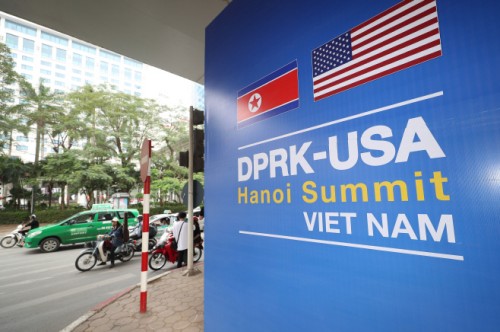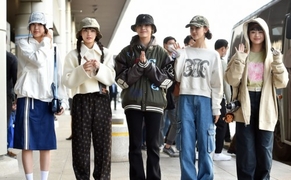 |
| A public signboard welcomes the upcoming summit between U.S. President Donald Trump and North Korean leader Kim Jong-un on February 19, 2019 in Hanoi, Vietnam./ Source: Yonhap News |
By AsiaToday reporter Heo Go-woon & Hong Sun-mi
We will see whether U.S. President Donald Trump and North Korean leader Kim Jong-un will reach consensus on resuming inter-Korean economic cooperation projects as part of corresponding measures for the North’s denuclearization steps during the upcoming second Trump-Kim summit in Hanoi.
President Moon Jae-in held a telephone conversation with U.S. President Donald Trump on Tuesday ahead of the second Trump-Kim summit to be held on Feb. 27-28 in Hanoi, Vietnam.
Moon told Trump to have South Korea play a role in providing corresponding measures to encourage North Korea’s denuclearization. The South Korean president said the country is ready to play that role by connecting inter-Korean railways and roads and launching inter-Korean economic cooperation projects if asked by President Trump.
“President Trump’s reaction was positive,” Cheong Wa Dae spokesperson Kim Eui-kyeom said in a briefing on Wednesday. “I understood (President Moon’s offer) was to say he could help increase the number of cards President Trump can use.”
“It seems Moon’s message was aimed at reducing Washington’s economic burden,” said Shin Beom-chul, the director of the Center for Security and Unification at the Asan Institute for Policy Studies in Seoul.
Since inter-Korean economic cooperation would be a result of easing sanctions against the North, many expected that the United States would not directly suggest resuming inter-Korean economic cooperation projects in negotiations with the North. However, experts argue that the mood has changed with the phone conversation between Moon and Trump.
“The United States is apparently keeping the inter-Korean economic cooperation card in mind since it can fulfill the demands of two Koreas without paying their own money,” said Moon Sung-mook, head of the Korea Research Institute’s National Unification Strategy Center.
People are paying attention to whether U.S. Special Representative for North Korea Stephen Biegun and his North Korean counterpart Kim Hyok-chol will deal with inter-Korean economic cooperation as part of corresponding measures at the working-level talks in Vietnam. South Korea’s chief nuclear envoy Lee Do-hoon, who plans to visit Hanoi soon, is highly likely to discuss with the United States over whether to use the inter-Korean economic cooperation card.
Experts say that if the leaders of the United States and North Korea reach a consensus to some extent on the inter-Korean economic cooperation projects, the Hanoi Declaration would include basic phrases related to the inter-Korean economic cooperation projects. Based on this, specific business talks would begin between the two Koreas and the United States and South Korea. Besides, Chairman Kim’s Seoul visit, which will be carried out after the second Trump-Kim summit, is expected to accelerate inter-Korean economic cooperation.
◇ President Moon urges to ease sanctions against the North. It depends on North Korea’s denuclearization steps
Some argue that President Moon urged the United States to provide a partial lifting or alleviating of sanctions in the phone conversation with Trump. This is because in order to resume inter-Korean economic cooperation projects, the United States and the international community should either ease sanctions or exempt North Korea from sanctions. Sanctions relief and sanctions relaxation is what North Korea wants very desperately.
However, North Korea should has to present tangible denuclearization steps at the second Trump-Kim summit in order to ease sanctions and resume inter-Korean economic cooperation projects.
#inter-Korean economic cooperation #Moon Jae-in #Donald Trump #Trump-Kim summit
Copyright by Asiatoday
Most Read
-
1
-
2
-
3
-
4
-
5
-
6
-
7





















